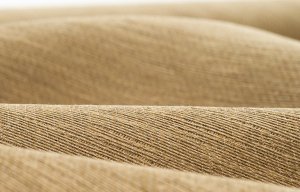
Focus on flax for Saertex
Naturally Advanced Technologies (NAT), which recently developed hemp yarns and fabrics with cotton like properties, is now using flax fibres in the next phase of its Crailar technology. The productivity of processing using flax is said to be twice as efficient as it is with hemp, yielding nearly twice as much usable fibre after going through the Crailar process. “Today, we are pleased to announce that we have created a sustainable, commercially viable com

23rd September 2010
Innovation in Textiles
|
Portland, OR
 Naturally Advanced Technologies (NAT), which recently developed hemp yarns and fabrics with cotton like properties, is now using flax fibres in the next phase of its Crailar technology.
Naturally Advanced Technologies (NAT), which recently developed hemp yarns and fabrics with cotton like properties, is now using flax fibres in the next phase of its Crailar technology.
The productivity of processing using flax is said to be twice as efficient as it is with hemp, yielding nearly twice as much usable fibre after going through the Crailar process.
“Today, we are pleased to announce that we have created a sustainable, commercially viable complement to cotton using flax as a raw material. After successfully transforming hemp fibres into yarns and fabrics with the desirable qualities of cotton, we are now engaged in a strategic shift to use flax fibres as the foundation for the next phase of our proprietary Crailar Organic Fiber technology.
"This is an industry first," said Ken Barker, CEO of Naturally Advanced Technologies. "With cotton prices currently at 90 to 93 cents per pound, flax is a cost-effective raw material for fibre production. The productivity of our process using flax is twice as efficient as it is with hemp, yielding nearly twice as much usable fibre after going through the Crailar process. Our recent spinning trials with Crailar-processed flax have been highly successful, which further validates the feasibility of flax as a practical, economically viable complement to cotton."
Flax is known to be easy to grow with minimal use of herbicides, pesticides and engineered irrigation and is abundant in the U.S. and Canada, which significantly reduces costs from a supply-chain perspective as compared to other natural fibres.
According to NAT, the Crailar process can also be used with the stalk portion of the oilseed flax plant, traditionally cultivated for food and industrial applications, which would normally be discarded during processing. The company adds that making use of this by-product, in addition to processing fibre-variety flax, further enhances Crailar’s sustainability factor.
NAT says the all-natural, 100%-organic Crailar process is the first to successfully remove the binding agents from flax that contribute to its stiff texture. “The process bathes bast fibres in a proprietary enzyme wash that transforms them into soft, yet strong and durable textile fibres, which can be used in both fashion and industrial applications.
Fibres made through the Crailar process have the comfort and breathability of cotton, with the strength, moisture-wicking properties and shrink-resistance of sturdy bast fibres. Our recent trials have proven that flax can be spun on existing machinery to produce a yarn that can be used alone or blended with other fibres,” says NAT.
“We are now in the advanced stages of developing partner relationships with industry giants that produce goods with fashion and industrial textiles. Spinning trials are currently underway.”
"The opportunity is tremendous" added Ken Barker. "Our ability to economically commercialize flax fibres in partnership with brands that have such broad consumer bases means, for the first time, sustainability can be affordable to everyone."

Business intelligence for the fibre, textiles and apparel industries: technologies, innovations, markets, investments, trade policy, sourcing, strategy...
Find out more